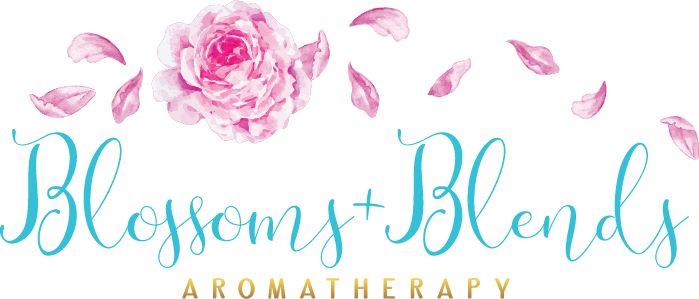What is aromatherapy?
Aromatherapy is a complementary, holistic modality that uses plants to support people's mental, physical, emotional, and spiritual health.
The most popular form of aromatherapy is the use of essential oils, which are aromatic plant essences. The plants use these essences to attract pollinators and keep predators away. Essential oils are created by harvesting the plant and then extracting these essences through a variety of methods. These extractions include: steam distillation, cold-pressing, solvent extraction, or C02 extraction. They can be used through inhalation or topically.
Aromatherapy also includes the use of plant-derived butters and oils. This includes herbally-infused oils such as St. John's Wort, butters such as Shea, or the ever so popular, coconut oil. These carriers have their own therapeutic value and can enhance essential oils if blended properly. They can also be used on their own!
Hydrosols are another component to aromatherapy. These by-products of steam distillation contain the water-soluble molecules of essential oils. Therefore, they are gentle yet effective products that can be used to support our body systems.
What can aromatherapy help?
First of all, I want to make it clear that aromatherapists do not diagnose, treat, or prescribe. We are not doctors nor do we play one on T.V. We are not witch doctors either. This is not voodoo. Aromatherapy is an art and a SCIENCE. Without understanding botany, chemistry, and anatomy and physiology, you cannot fully understand aromatherapy. There is research out there to support claims of aromatherapy helping well-being.
Yet, aromatherapy cannot do everything. Despite the popular saying, "There's an oil for that!', there are limitations to power of plants. A qualified aromatherapist understands that aromatherapy is complementary and does not replace medical intervention when needed. Always inform your health care provider that you use aromatherapy.
In a best case scenario, you would be seeking guidance from a trained aromatherapist who will collaborate with your health care provider. I would be happy to help you with any of these issues. I have the knowledge and experience to work with children as well. In fact, they tend to be my favorite clients. (No offense to my adult clients. 😊). I just particularly enjoy introducing a new generation to the magic of aromatherapy and seeing how much they love it. I am deeply passionate about using aromatherapy safely with them, so rest assured, they are in good hands.
Aromatherapy can help with:
Stress management
Feelings of anxiousness
Feelings of sadness
Mental clarity/concentration/memory
Soothing irritated skin
Supporting joint and muscle health
Seasonal respiratory support
Reducing tension in the body
Supporting the immune system
Promoting a more restful sleep
Much more.....
Chamomile
Where do I get accurate information?
When I was beginning, I was utter confused. Everything I read seemed to conflict. This source said it was safe. That source says it wasn't. Just WHO should you believe? As a professional aromatherapist, you need to find sources that are COMPANY NEUTRAL Meaning, their "education" doesn't just apply to their company. Big red flag. Here are some trusted, well respected resources within the aromatherapy community.
Organizations
National Association of Holistic Aromatherapy (NAHA): www.naha.org
Alliance of International Aromatherapists (AIA): www.alliance-aromatherapists.org
International Federation of Professional Aromatherapists (IFPA): http://ifparoma.org
Canadian Federation of Aromatherapists: http://cfacanada.com
Books/Magazines/Journals
Essential Oil Safety:
-Essential Oil Safety: A Guide for Health Care Professionals by
Robert Tisserand and Rodney Young .
Beginner/Intermediate :
-The Heart of Aromatherapy by Andrea Butje
-Essential Living by Andrea Butje
-The Complete Aromatherapy and Essential Oils Handbook for Everyday
Wellness by Lora Cantele & Nerys Purchon
-Aromatica: A Clinical Guide to Essential Oil Therapeutics. Volume 1: Principles
and Profiles 1st Edition by Peter Holmes
-Aromatica Volume 2: A Clinical Guide to Essential Oil Therapeutics. Applications and Profiles by Peter Holmes
-The Complete Guide to Aromatherapy - Second Edition by Salvatore Battaglia
-The Encyclopedia of Essential Oils: The Complete Guide to the Use of Aromatic
Oils In Aromatherapy, Herbalism, Health, and Well Being by Julia Lawless
-Aromatherapy for Healing the Spirit: Restoring Emotional and Mental Balance
with Essential Oils by Gabriel Mojay
-375 Essential Oils and Hydrosols by Jeanne Rose
-The Art of Aromatherapy by Robert Tisserand
-Essential Oils: A Handbook for Aromatherapy Practice 2nd Edition by Jennifer
Peace Rhind
-Aromatherapeutic Blending: Essential Oils in Synergy 1st by Jennifer Peace Rhind
-The Complete Book of Essential Oils and Aromatherapy by Valerie Ann Worwood
NEWEST EDITION ONLY!
-Any of the organizations’ journals listed above (NAHA, AIA, IFPA, CFA)
Advanced:
-Clinical Aromatherapy: Essential Oils in Healthcare, 3e by Jane Buckle PhD RN
-Complementary Nursing in End of Life Care Integrative
care in Palliative Care 2015 by Madeleine Kerkhof-Knapp
-Aromatherapy for Health Professionals, 4e (Price, Aromatherapy for Health
Professionals) 4th Edition by Shirley Price Cert Ed FISPA MIFA FIAM & Len Price Cert Ed
MIT(Trichology) FISPA FIAM
Chemistry/Advanced:
-The Chemistry of Aromatherapeutic Oils 3rd Edition by E. Joy Bowles
Hydrosols:
-Hydrosols: The Next Aromatherapy by Suzanne Catty
-Harvest to Hydrosol Distill Your Own Exquisite Hydrosols at Home by Ann Harman
Carrier Oils:
-Power of the Seed: Your Guide to Oils for Health & Beauty (Process Selfreliance
Series) by Susan M. Parker
-Carrier Oils: For Aromatherapy and Massage by Len Price & Shirley Price
People
(Here are the big names in the industry who are in charge of aromatherapy schools/respected instructors. This is not an all-inclusive list and is in no particular order.)
Andrea Butje
Robert Tisserand
Gabriel Mojay
Sylla Shepherd-Hanger
Marge Clark
Liz Fulcher
Mark Webb
Jade Shutes
Cathy Skipper
Jennifer Peace Rhind
Joy Musacchio
Rhiannon Lewis
Jeanne Rose
Peter Holmes
Madeleine Kerkhof
Ylang Ylang





